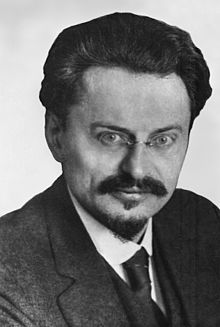Leon Trosky
| Leon Trotsky | |
|---|---|

Trotsky in 1929
|
|
| People's Commissar of Military and Naval Affairs of the Soviet Union | |
|
In office 13 March 1918 – 15 January 1925 |
|
| Premier |
Vladimir Lenin Alexei Rykov |
| Preceded by | Nikolai Podvoisky |
| Succeeded by | Mikhail Frunze |
| People's Commissar of Foreign Affairs of the RSFSR | |
|
In office 8 November 1917 – 13 March 1918 |
|
| Premier | Vladimir Lenin |
| Preceded by | Mikhail Tereshchenko |
| Succeeded by | Georgy Chicherin |
| President of the Petrograd Soviet | |
|
In office 8 October – 8 November 1917 |
|
| Full member of the 6th, 7th, 8th, 9th, 10th, 11th, 12th, 13th, 14th Politburo | |
|
In office 10 October 1917 – 23 October 1926 |
|
| Personal details | |
| Born |
Lev Davidovich Bronstein 7 November 1879 near Yelizavetgrad, Kherson Governorate, Russian Empire (now in Ukraine) |
| Died | 21 August 1940 (aged 60) Coyoacán, Mexico City, Mexico |
| Cause of death | Assassination |
| Citizenship | Soviet |
| Political party |
RSDLP SDPS Mezhraiontsy CPSU Fourth International |
| Spouse(s) |
Aleksandra Sokolovskaya Natalia Sedova |
| Children |
Zinaida Volkova Nina Nevelson Lev Sedov Sergei Sedov |
| Signature |  |
Leon Trotsky (/ˈtrɒtski/;; also transliterated Lyev, Trotski, Trotskij, Trockij and Trotzky. born Lev Davidovich Bronstein; 7 November 1879 – 21 August 1940) was a Marxist revolutionary, theorist, and Soviet politician. Initially supporting the Menshevik Internationalists faction within the Russian Social Democratic Labour Party, he joined the Bolsheviks ("majority") just before the 1917 October Revolution, immediately becoming a leader within the Communist Party. He would go on to become one of the seven members of the first Politburo, founded in 1917 to manage the Bolshevik Revolution. During the early days of the Russian Soviet Federative Socialist Republic (RSFSR) and the Soviet Union, he served first as People's Commissar for Foreign Affairs and later as the founder and commander of the Red Army, with the title of People's Commissar of Military and Naval Affairs. He became a major figure in the Bolshevik victory in the Russian Civil War (1918–1923).
After leading a failed struggle of the Left Opposition against the policies and rise of Joseph Stalin in the 1920s and against the increasing role of bureaucracy in the Soviet Union, Trotsky was removed from power (October 1927), expelled from the Communist Party (November 1927), exiled to Alma–Ata (January 1928), and exiled from the Soviet Union (February 1929). As the head of the Fourth International, Trotsky continued to oppose the Stalinist bureaucracy in the Soviet Union from exile. On 20 August 1940, Trotsky was assassinated by Ramón Mercader, a Spanish-born NKVD agent, passing away the next day in a hospital. Mercader, who attacked Trotsky with an ice axe, acted upon instruction from Stalin and was nearly beaten to death by Trotsky's bodyguards, with Mercader spending 20 years in a Mexican prison for murdering Trotsky. Stalin presented Mercader with an Order of Lenin in absentia.
...
Wikipedia
